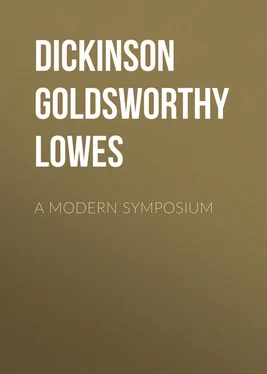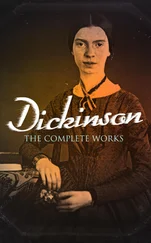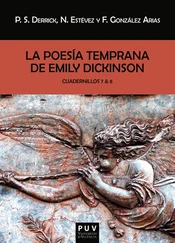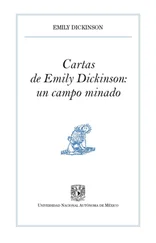Goldsworthy Dickinson - A Modern Symposium
Здесь есть возможность читать онлайн «Goldsworthy Dickinson - A Modern Symposium» — ознакомительный отрывок электронной книги совершенно бесплатно, а после прочтения отрывка купить полную версию. В некоторых случаях можно слушать аудио, скачать через торрент в формате fb2 и присутствует краткое содержание. Жанр: foreign_antique, foreign_prose, на английском языке. Описание произведения, (предисловие) а так же отзывы посетителей доступны на портале библиотеки ЛибКат.
- Название:A Modern Symposium
- Автор:
- Жанр:
- Год:неизвестен
- ISBN:нет данных
- Рейтинг книги:5 / 5. Голосов: 1
-
Избранное:Добавить в избранное
- Отзывы:
-
Ваша оценка:
- 100
- 1
- 2
- 3
- 4
- 5
A Modern Symposium: краткое содержание, описание и аннотация
Предлагаем к чтению аннотацию, описание, краткое содержание или предисловие (зависит от того, что написал сам автор книги «A Modern Symposium»). Если вы не нашли необходимую информацию о книге — напишите в комментариях, мы постараемся отыскать её.
A Modern Symposium — читать онлайн ознакомительный отрывок
Ниже представлен текст книги, разбитый по страницам. Система сохранения места последней прочитанной страницы, позволяет с удобством читать онлайн бесплатно книгу «A Modern Symposium», без необходимости каждый раз заново искать на чём Вы остановились. Поставьте закладку, и сможете в любой момент перейти на страницу, на которой закончили чтение.
Интервал:
Закладка:
"Verily she has had her reward! Search the records of history, and you will seek in vain for a prosperity so immense, so continuous, so progressive, as that which has blessed this country in the last half-century of her annals. This access of wealth was admitted indeed by the speaker who preceded me. But he complained that we had taken no account of the changes which the new system was introducing into the character and occupations of the people. It is true; and he would be a rash man who should venture to forecast and to determine the remoter results of such a policy; or should shrink from the consequences of liberty on the ground that he cannot anticipate their character. Which of us would have the courage, even if he had the power, to impose upon a nation for all time the form of its economic life, the type of its character, the direction of its enterprise? The possibilities that lie in the womb of Nature are greater than we can gauge; we can but facilitate their birth, we may not prescribe their anatomy. The evils of the day call for the remedies of the day; but none can anticipate with advantage the necessities of the future. And meantime what cause is there for misgiving? I confess that I see none. The policy of freedom has been justified, I contend, by its results. And so confident am I of this, that the time, I believe, is not far distant, when other countries will awake at last to their own true interests and emulate, not more to their advantage than to ours, our fiscal legislation. I see the time approaching when the nations of the world, laying aside their political animosities, will be knitted together in the peaceful rivalry of trade; when those barriers of nationality which belong to the infancy of the race will melt and dissolve in the sunshine of science and art; when the roar of the cannon will yield to the softer murmur of the loom, and the apron of the artisan, the blouse of the peasant be more honourable than the scarlet of the soldier; when the cosmopolitan armies of trade will replace the militia of death; when that which God has joined together will no longer be sundered by the ignorance, the folly, the wickedness of man; when the labour and the invention of one will become the heritage of all; and the peoples of the earth meet no longer on the field of battle, but by their chosen delegates, as in the vision of our greatest poet, in the 'Parliament of Man, the Federation of the World.'"
WITH this peroration Remenham resumed his seat. He had spoken, as indeed was his habit, rather as if he were addressing a public meeting than a company of friends. But at least he had set the ball rolling. To many of those present, as I well knew, his speech and his manner must have been eminently provocative; and naturally to none more than to Mendoza. I had, therefore, no hesitation in signalling out the Conservative chief to give us the opposite point of view. He responded with deliberation, lifting from his chest his sinister Jewish face, and slowly unfolding his long body, while a malicious smile played about his mouth.
"One," he began, "who has not the privilege of immediate access to the counsels of the Divine Being cannot but feel himself at a disadvantage in following a man so favoured as my distinguished friend. The disadvantage, however, is one to which I have had, perforce, to grow accustomed during long years of parliamentary strife, I have resigned myself to creeping where he soars, to guessing where he prophesies. But there is compensation everywhere. And, perhaps, there are certain points which may be revealed to babes and sucklings, while they are concealed from beings more august. The worm, I suppose, must be aware of excrescences and roughnesses of the soil which escape the more comprehensive vision of the eagle; and to the worm, at least, these are of more importance than mountain ranges and oceans which he will never reach. It is from that humble point of view that I shall offer a few remarks supplementary to, perhaps even critical of, the eloquent apostrophe we have been permitted to enjoy.
"The key-note of my friend's address was liberty. There is no British heart which does not beat higher at the sound of that word. But while I listened to his impassioned plea, I could not help wondering why he did not propose to dispense to us in even larger and more liberal measure the supreme and precious gift of freedom. True, he has done much to remove the barriers that separated nation from nation, and man from man. But how much remains to be accomplished before we can be truly said to have brought ourselves into line with Nature! Consider, for example, the policeman! Has my friend ever reflected on all that is implied in that solemn figure; on all that it symbolizes of interference with the purposes of a beneficent Creator? The policeman is a permanent public defiance of Nature. Through him the weak rule the strong, the few the many, the intelligent the fools. Through him survive those whom the struggle for existence should have eliminated. He substitutes the unfit for the fit. He dislocates the economy of the universe. Under his shelter take root and thrive all monstrous and parasitic growths. Marriage clings to his skirts, property nestles in his bosom. And while these flourish, where is liberty? The law of Nature we all know:
The good old rule, the ancient plan
That he should take who has the power,
And he should keep who can!
"But this, by the witchcraft of property, we have set aside. Our walls of brick and stone we have manned with invisible guards. We have thronged with fiery faces and arms the fences of our gardens and parks. The plate-glass of our windows we have made more impenetrable than adamant. To our very infants we have given the strength of giants. Babies surfeit, while strong men starve; and the foetus in the womb stretches out unformed hands to annex a principality. Is this liberty? Is this Nature? No! It is a Merlin's prison! Yet, monstrous, it subsists! Has our friend, then, no power to dissolve the charm? Or, can it be that he has not the will?
"Again, can we be said to be free, can we be said to be in harmony with Nature, while we endure the bonds of matrimony? While we fetter the happy promiscuity of instinct, and subject our roving fancy to the dominion of 'one unchanging wife?' Here, indeed, I frankly admit, Nature has her revenges; and an actual polygamy flourishes even under the aegis of our law. But the law exists; it is the warp on which, by the woof of property, we fashion that Nessus-shirt, the Family, in which, we have swathed the giant energies of mankind. But while that shirt clings close to every limb, what avails it, in the name of liberty, to snap, here and there, a button or a lace? A more heroic work is required of the great protagonist, if, indeed, he will follow his mistress to the end. He shakes his head. What! Is his service, then, but half-hearted after all? Or, can it be, that behind the mask of the goddess he begins to divine the teeth and claws of the brute? But if nature be no goddess, how can we accept her as sponsor for liberty? And if liberty be taken on its own merits, how is it to be distinguished from anarchy? How, but by the due admixture of coercion? And, that admitted, must we not descend from the mountain-top of prophecy to the dreary plains of political compromise?"
Up to this point Mendoza had preserved that tone of elaborate irony which, it will be remembered, was so disconcerting to English audiences, and stood so much in the way of his popularity. But now his manner changed. Becoming more serious, and I fear I must add, more dull than I had ever heard him before, he gave us what I suppose to be the most intimate exposition he had ever permitted himself to offer of the Conservative point of view as he understood it.
"These," he resumed, "are questions which I must leave my friend to answer for himself. The ground is too high for me. I have no skill in the flights of speculation. I take no pleasure in the enunciation of principles. To my restricted vision, placed as I am upon the earth, isolated facts obtrude themselves with a capricious particularity which defies my powers of generalization. And that, perhaps, is the reason why I attached myself to the party to which I have the honour to belong. For it is, I think, the party which sees things as they are; as they are, that is, to mere human vision. Remenham, in his haste, has called us the party of reaction. I would rather say, we are the party of realism. We have in view, not Man, but Englishmen; not ideal polities, but the British Constitution; not Political Economy, but the actual course of our trade. Through this great forest of fact, this tangle of old and new, these secular oaks, sturdy shrubs, beautiful parasitic creepers, we move with a prudent diffidence, following the old tracks, endeavouring to keep them open, but hesitating to cut new routes till we are clear as to the goal for which we are asked to sacrifice our finest timber. Fundamental changes we regard as exceptional and pathological. Yet, being bound by no theories, when we are convinced of their necessity, we inaugurate them boldly and carry them through to the end. And thus it is that having decided that the time had come to call the people to the councils of the nation, we struck boldly and once for all by a measure which I will never admit – and here I regret that Cantilupe is not with me – which I will never admit to be at variance with the best, and soundest traditions of conservatism.
Читать дальшеИнтервал:
Закладка:
Похожие книги на «A Modern Symposium»
Представляем Вашему вниманию похожие книги на «A Modern Symposium» списком для выбора. Мы отобрали схожую по названию и смыслу литературу в надежде предоставить читателям больше вариантов отыскать новые, интересные, ещё непрочитанные произведения.
Обсуждение, отзывы о книге «A Modern Symposium» и просто собственные мнения читателей. Оставьте ваши комментарии, напишите, что Вы думаете о произведении, его смысле или главных героях. Укажите что конкретно понравилось, а что нет, и почему Вы так считаете.












